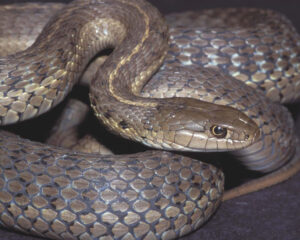
Stevan J. Arnold – Snake Research
Snake research in our laboratory focused on the evolutionary processes that produce genetic differences between local populations of garter snakes: namely, drift, selection, gene flow, and inheritance. We studied how these processes affect the evolution of vertebral numbers, coloration, physiology and life history. The carousel images of snake research at Eagle Lake, Lassen County, CA, taken from 1974 to about 2009, show investigators, habitats, snakes, snake prey, and snake predators. To learn about ongoing research at Eagle Lake, visit Anne Bronikowski’s website.
tadpole shrimp
tadpole shrimp (Triops), a denizen of vernal ponds
Tripos underside
Spadefoot tadpole
last remant of the meadow habitat of spadefoot tadpoles in July
Great Basin Spadefoot (Spea intermontana) near the July remnant of its natal pool
coyote skull
coyote skull and mandible
Lynne Houck, Cynthia Heringer, Hilary Arnold Godwin and Laura Arnold Leibman landing near Wildcat Point
Lynne Houck
Steve with gopher snake
aerial view of Wildcat Point
female Sceloporus occidentalis in the process of excavating a nest for her eggs
close up of the nesting female, later released
Western Fence Swift male (Sceloporus occidentalis)
Paiute house ring
Paiute house ring
Great Basin Rattlesnake
Josef Uyeda and Blue Racer (Coluber constrictor). Adult Coluber can prey on T. elegans
Paul Hohenlohe and Josef Uyeda striking a pose usually reserved for much larger snakes
Shoreline near Eagle Lake Field Station
Anne Bronikowski and her field crew
Anne bronikowski demonstrates scaling clipping that gives each snake a unique mark
Lakeshore (above) and meadow (below) ecomorphs of T. elegans
Steve surpervises the seining operation
Seining for larval amphibians (Ambystoma macrodactylum and Pseudacris regilla)
Boreal Toad tadpoles in social aggregation
Meadow T. elegans in situ
field crew at Papoose Meadow
Papoose Meadow
Zeena explores Papoose Meadow
Hoary Bat (Lasiurus cinereus). Smaller species of bats are eaten by T. elegans
Tiger Lily
Pikes Point
These leeches (Erpobdella punctata) are eaten by lakeshore T. elegans
T. elegans making a valiant effor to swallow a dead Lahotan sucker
A group of garter snakes (Thamnophis elegans) captured at the lakeshore at Pikes Point
Shoreline at Wildcat Point
snake processing table, equipment and shipping boxes
Steve contemplates a recently scavenged road-kill Great Basin Rattlesnake (Crotalus lutosus)
preserving the rattlesnake with a formaldehyde solution
Enthusiastic processing helper
Chuck Peterson calibrating radio telemeters
Anne scale-clipping
Gallatin beach
Pacific Chorus Frog, an important prey of T. elegans
Fall colors at Nameless Meadow
metamorphic Boreal Toads are eaten by lakeshore and meadow T. elegans
